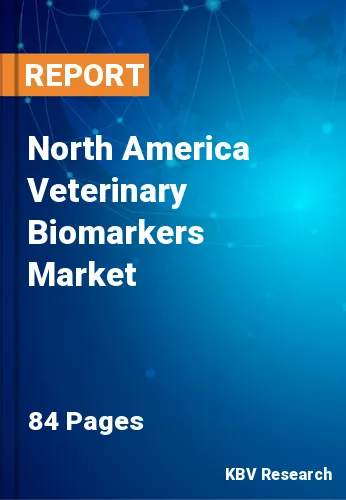The North America Veterinary Biomarkers Market would witness market growth of 11.1% CAGR during the forecast period (2022-2028).
The species, breed, sex, and age of the animal should be identified on a biological level because these variances may cause noticeable alterations in the composition of body fluids. Additionally, the animal's food, diurnal fluctuations, and reproductive state should be considered. Similar to how handling an animal or altering its surroundings can result in a stress reaction, biomarker validation may be hampered. In order to acquire consistent results throughout laboratories, and uniform protocol for sample collection, processing, and storage must be created. Validation of the sensitivity and specificity of the assays used to quantify a biomarker is also necessary.
Numerous serious animal diseases have complicated, multivariate origins, which pose special difficulties. Therefore, the identification of biomarkers or biomarker profiles will be a crucial step in the diagnosis and treatment of animal disease. The development of methodologies aiming at identifying precise and sensitive biomarkers from the hundreds of molecules present in a tissue or biological fluid has been facilitated by the rise of post-genomic technology.
In North America, pet insurance often pays in full or in part for the treatment of an insured person's sick or wounded animal. If a pet is stolen, lost, or dies, insurance payouts may also be made. The North American Pet Health Insurance Association is the primary regulatory body for the pet insurance market that operates in the United States and Canada (NAPHIA). The region sees a growing need for companionship, especially after COVID-19. The realization of pets as better companions for people led to the trend of rising adoption in the region.
The US market dominated the North America Veterinary Biomarkers Market by Country in 2021, and would continue to be a dominant market till 2028; thereby, achieving a market value of $393.1 million by 2028. The Canada market is poised to grow at a CAGR of 13.6% during (2022 - 2028). Additionally, The Mexico market would witness a CAGR of 12.6% during (2022 - 2028).
Based on Animal Type, the market is segmented into Companion (Dogs, Cats, and Others) and Production. Based on Disease Type, the market is segmented into Inflammatory & Infectious Diseases, Turf & Landscaping, Tumor, Skeletal Muscle Diseases, and Others. Based on Product Type, the market is segmented into Biomarkers, Kits & Reagents and Biomarker Readers. Based on Application, the market is segmented into Disease Diagnostics, Preclinical Research, and Others. Based on countries, the market is segmented into U.S., Mexico, Canada, and Rest of North America.
Free Valuable Insights: The Global Veterinary Biomarkers Market is Estimated to reach $1.5 Billion by 2028, at a CAGR of 11.7%
The market research report covers the analysis of key stake holders of the market. Key companies profiled in the report include Zoetis, Inc., Merck & Co., Inc., Virbac, IDEXX Laboratories, Inc., MI:RNA Diagnostics Ltd., Mercodia AB, Antech Diagnostics, Inc. (Mars, Inc.), Avacta Animal Health Limited (Vimian Group), Life Diagnostics, Inc., and Acuvet Biotech.
By Animal Type
By Disease Type
By Product Type
By Application
By Country
Our team of dedicated experts can provide you with attractive expansion opportunities for your business.

